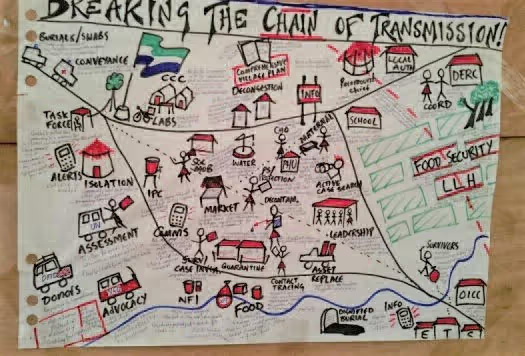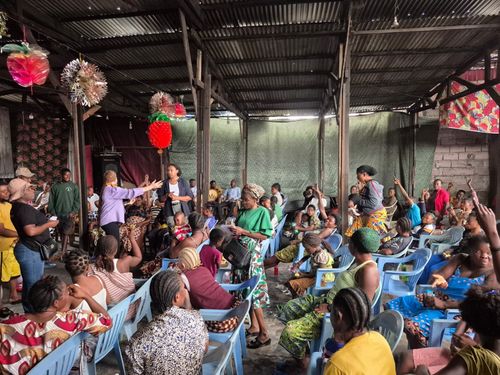Ebola Response Anthropology Platform

Project overview
The Ebola Response Anthropology Platform enabled social scientists and outbreak control teams to interact to develop a co-ordinated, adaptive and iterative response to the Ebola outbreak.
Project solution
This project offers [specific solution or intervention] to tackle [challenge]. By implementing [strategies, tools, or innovations], the project aims to achieve [desired outcomes]. The approach is designed to [specific actions or methods] to bring about meaningful change in [community, region, or issue area].
Expected outcomes
This project aims to achieve [specific outcomes], such as [measurable results, improvements, or changes]. The expected impact includes [benefits to the target community, advancements in research or innovation, or long-term effects]. By the end of the project, we anticipate [specific changes or milestones] that will contribute to [broader goals or objectives].
Principal Investigator: Melissa Parker, London School of Hygiene & Tropical Medicine
What did the study set out to achieve?
The Ebola epidemic in West African left 11,000+ dead and 17,000+ survivors struggling with devastating social, economic and medical consequences. The public health response faltered for a variety of reasons, especially social and cultural ones. To address these, a team of anthropologists with longstanding knowledge, partnerships and commitments in the 'tri-border' region of Sierra Leone-Guinea-Liberia mobilised in 2014 to bring real-time advice to the medical and humanitarian response as unprecedented and uncertain events unfolded.
The key deliverable was an online resource for local outbreak control teams to receive real-time advice from anthropologists and social scientists on how to build and implement context-appropriate interventions. The platform developed by this team hosts details on social, historical, political and economic issues that might influence the effectiveness of the interventions. The platform (ebola-anthropology.net) went on-line in October 2014 publishing all briefings entirely open-access. In the first 12 months there were 11,464 unique users from 166 countries who had accessed the website 18,167 times, viewing 50,585 pages and unique-downloading policy briefings 1,828 times. More than 35 briefings and guidelines written by/contributed to by Platform members on a wide range of subjects.
What were the key findings?
The initiative provided:
- Critical insights on how social scientists can interact effectively with policymakers to influence a humanitarian response, particularly by UK policy actors. The researchers found that the extent to which advice can make a significant contribution to policy is greatly facilitated by close proximity and interaction between 'expert' advisors and policymakers.
- Key insights to inform the response. Rapid research outputs focused on public health topics such as how to conduct safe burials and funerals, home-based care for Ebola patients, the psychosocial impact of Ebola on responders, and the influence of social networks in Sierra Leone on pathways of transmission.
A common theme of the findings was the need to involve local communities, in all their diversity, in respectful dialogue when designing and delivering responses; another was the importance of avoiding one-size-fits-all approaches but instead attuning humanitarian responses to political-economic, social and cultural contexts to increase te effectiveness and impact of responses to Ebola.
Ebola Response Anthropology Platform
Resource portal to enable rapid access to key resources in relation to the socio-cultural and political dimensions of the outbreak in West Africa
[.cta_link]View Platform[.cta_link]
What does this mean for policymakers and practitioners?
The Ebola Response Anthropology Platform enabled social scientists and outbreak control teams to interact to develop a co-ordinated, adaptive and iterative response to the Ebola outbreak. The research helped to build a more locally appropriate and socially informed outbreak response by providing clear, practical, real-time advice that engages with crucial socio-cultural and political dimensions of the outbreak. The research team also completed a number of rapid response fieldwork projects:
- Evaluation of Community Care Centres, Sierra Leone: including policy briefing published in February 2015.
- Data collation and evaluation of the Ebola response to date in Sierra Leone.
- Sierra Leone diaspora communications.
After the epidemic, ERAP members established the broader Social Science in Humanitarian Action Platform (SSHAP). SSHAP encourages effective, adaptive and contextually informed responses to health-related emergency crises, and contributes to expert groups at the UN and WHO. SSHAP has helped to shape more recent responses - including 2018 DRC Ebola and COVID-19 - and fed into the UN Inter-Agency Standing Committee interim guidelines on humanitarian settings.
Project delivery & updates
Stay up to date with the latest developments from this project. Here, you will find details on what has been delivered, resources created, and regular updates as the project progresses. Access key documents, reports, and other materials to see how the project is making an impact.
Resources
Journal article
LEARN MOREJournal article
LEARN MOREJournal article
LEARN MOREJournal article
LEARN MOREJournal article
LEARN MORECase study
LEARN MORE





